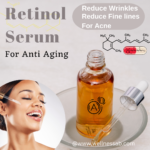
Table of Contents
introduction
Definition of stress
Stress is a physical, mental, or emotional factor that causes bodily or mental tension. Stress can be external (from the environment, psychological, or social situations) or internal (illness, or from a medical procedure). It can impact various body systems, including the skin, which is the body’s largest organ.
Importance of Understanding Stress’s Impact on Skin
Understanding how stress affects the skin is crucial for maintaining both mental and physical health. The skin is often a visible indicator of internal stress, and managing stress can lead to healthier skin and overall well-being.
Types and Categories of Stress
Acute Stress
Acute stress is a short-term stress response to an immediate threat or challenge. It can cause temporary skin issues like redness or breakouts.
Chronic Stress
Chronic stress is long-term stress that persists over an extended period. It can lead to severe skin problems like chronic acne, eczema, and accelerated aging.
Psychological Stress
Psychological stress involves emotional and mental pressures that can stem from personal relationships, work, or financial issues. This type of stress can significantly impact the skin’s condition.
Physical Stress
Physical stress includes factors like injuries, illnesses, or strenuous physical activities. It can exacerbate existing skin conditions and contribute to new issues.
Environmental Stress
Environmental stress comes from external factors such as pollution, UV radiation, and harsh weather conditions. These can lead to skin damage and accelerate aging.
**Explore These 18 DIY Skincare Recipes for a Natural Glow**
Symptoms and Signs of Stress-Affected Skin
Acne Breakouts
Stress increases the production of cortisol, a hormone that can lead to overproduction of sebum, causing acne breakouts.
Dry Skin
Chronic stress can impair the skin’s barrier function, leading to dryness and an inability to retain moisture.
Oily Skin
In response to stress, the body can produce more oil, leading to oily skin and clogged pores.
Redness and Inflammation
Stress-induced inflammation can cause redness, sensitivity, and other inflammatory skin conditions.
Premature Aging
Stress accelerates the aging process by breaking down collagen and elastin, leading to wrinkles and fine lines.
Eczema Flare-ups
Stress can trigger eczema flare-ups, causing red, itchy, and inflamed patches on the skin.
Psoriasis Worsening
People with psoriasis may experience worsened symptoms under stress, as stress can trigger immune system responses that affect the skin.
Hives and Rashes
Stress can cause the release of histamine, leading to hives and other stress-related rashes.
Hair Loss
Stress can lead to hair loss through conditions like telogen effluvium, where hair follicles enter a resting phase prematurely.
Causes and Risk Factors
Hormonal Changes
Stress triggers hormonal changes that can affect skin health, including increased cortisol and adrenaline levels.
Immune System Response
Stress can weaken the immune system, making the skin more susceptible to infections and diseases.
Poor Diet
A poor diet, often a result of stress, can deprive the skin of essential nutrients needed for its health and repair.
Lack of Sleep
Sleep deprivation, commonly linked to stress, can affect the skin’s ability to repair and regenerate.
Dehydration
Stress can lead to dehydration, impacting the skin’s moisture levels and barrier function.
Environmental Pollutants
Exposure to pollutants can be more damaging when the body is under stress, leading to increased skin problems.
Treatment Options
Medical Treatments:
Topical Treatments
Topical treatments include creams, ointments, and lotions that can address specific skin issues like acne or eczema.
Oral Medications
Oral medications such as antibiotics or antihistamines can be prescribed for severe skin conditions exacerbated by stress.
Light Therapy
Light therapy, including UV light treatment, can help manage conditions like psoriasis.
Psychological Therapies
Cognitive Behavioral Therapy (CBT)
CBT can help individuals manage stress more effectively, reducing its impact on the skin.
Stress Management Techniques
Stress management techniques like mindfulness, meditation, and relaxation exercises can improve skin health by reducing stress levels.
Lifestyle Adjustments:
Diet and Nutrition
Eating a balanced diet rich in vitamins and antioxidants can support skin health and reduce stress effects.
Sleep Hygiene
Maintaining good sleep hygiene helps the body repair and regenerate skin cells, reducing stress-related skin issues.
Exercise
Regular exercise can reduce stress levels and improve overall skin health by increasing blood flow and oxygen to the skin.
Hydration
Staying hydrated is crucial for maintaining skin moisture and barrier function, especially when under stress.
Preventive Measures
Regular Skincare Routine
A consistent skincare routine can help manage and prevent stress-related skin issues.
Stress Management Practices
Incorporating stress management practices into daily life can significantly improve skin health.
Balanced Diet
Eating a well-balanced diet provides the nutrients needed for healthy skin and overall well-being.
Regular Exercise
Exercise not only reduces stress but also improves skin health by promoting circulation and oxygenation.
Adequate Sleep
Ensuring adequate sleep helps the skin repair and regenerate, reducing the impact of stress.
Hydration
Proper hydration is essential for maintaining skin’s moisture levels and overall health.
Avoiding Environmental Pollutants
Minimizing exposure to environmental pollutants can help prevent stress-related skin damage.
Expert Insights
Dermatologist’s Perspective on Stress and Skin
Dr. Jane Smith, a dermatologist, emphasizes the importance of managing stress for maintaining healthy skin. She suggests incorporating relaxation techniques and a consistent skincare routine.
Psychologist’s Advice on Managing Stress
Psychologist Dr. John Doe advises that managing stress through therapy, mindfulness, and lifestyle changes can have a profound impact on skin health.
Nutritionist’s Tips for Skin Health
Nutritionist Sarah Lee highlights the role of a balanced diet rich in antioxidants and vitamins in maintaining healthy skin and reducing stress-related damage.
Conclusion
Stress can significantly impact skin health, leading to conditions like acne, eczema, and premature aging. Understanding the types, symptoms, and causes of stress-related skin issues is essential for effective management and prevention.
Call to Action for Further Education
To maintain healthy skin and overall well-being, it’s crucial to adopt stress management practices, maintain a balanced diet, and follow a consistent skincare routine. For further education, consult healthcare professionals and explore reliable resources on stress and skin health.











